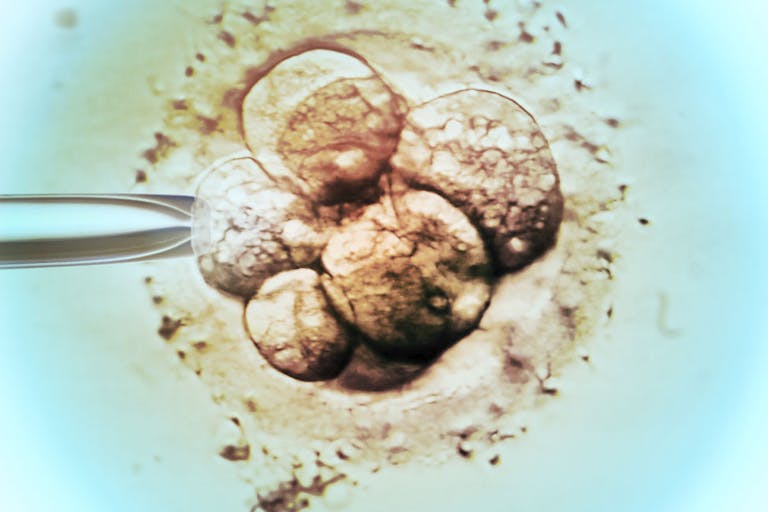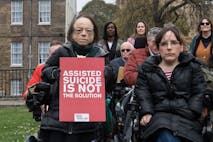
Texas library can keep sexually explicit material from minors... for now
Sheena Rodriguez
·
Nevada governor vetoes IVF bill that claimed pre-implantation embryos are not humans
Last week, Nevada’s Republican Gov. Joe Lombardo vetoed a bill that would have forced public and private insurance companies to cover in vitro fertilization (IVF) in the state.
Nevada Gov. Lombardo vetoed Senate Bill 217 on Thursday, June 12, 2025, which aimed to create a right to IVF and force public and private health insurance carriers in the state to cover the costs of IVF.
The bill also sought to redefine who qualifies as a human being, denying science by claiming human embryos outside of the uterus are not human beings.
Gov. Lombardo felt the law would open the door to an increase in lawsuits if someone felt their “right to IVF” was being “substantially burdened.”
Lombardo vetoed Senate Bill 217, which would have mandated that health insurance companies in the state cover IVF by creating a “right” to undergo IVF. According to The Washington Stand, 13 states and D.C. have approved similar legislation, and Lombardo is the first governor to veto such legislation.
He said that the biggest concern surrounding the bill was that it would create an opportunity for an abundance of lawsuits if people felt their “right” to fertility care was being “substantially burdened.”
According to Nevada News, he warned that this kind of language is open to interpretation that would allow any disagreement to turn into a legal battle and give courts and judges, not lawmakers, the power to decide policy issues.
“Courts should not be tasked with making budgetary or legislative decisions under the guise of constitutional interpretation,” said Lombardo.
Two days prior to the veto, a coalition of pro-life organizations — including Family Research Council, CatholicVote, Nevada Right to Life, and others — sent a letter to Gov. Lombardo urging him to veto the pro-IVF bill. The letter stated, “Based on estimates derived from CDC figures, at least 1.5 million human embryos created through IVF are destroyed every year.”
It went on to say:
The IVF industry currently operates in a wild west, with little to no regulation or restraint on its activities. It is already legal in Nevada. The bill would allow IVF practitioners to operate with complete impunity and hinder the state’s ability to enact health and safety regulations to protect women undergoing what is already a physically and mentally taxing process.
Article continues below
Dear Reader,
Have you ever wanted to share the miracle of human development with little ones? Live Action is proud to present the "Baby Olivia" board book, which presents the content of Live Action's "Baby Olivia" fetal development video in a fun, new format. It's perfect for helping little minds understand the complex and beautiful process of human development in the womb.
Receive our brand new Baby Olivia board book when you give a one-time gift of $30 or more (or begin a new monthly gift of $15 or more).
The groups noted that restorative reproductive medicine should be promoted above IVF as it is a scientific approach to infertility that works to cooperate with and restore natural fertilization.

In May, the Nevada Senate advanced the bill in a 15-5 vote with one abstention. The state Assembly passed it on June 2 in a 27-15 vote.
As previously reported by Live Action News, the bill aimed to “establish a statutory right to IVF treatment under state law, enhance protections for fertility treatment providers, and broaden coverage requirements for infertility diagnosis and treatment.”
But the bill went further, shockingly aiming to redefine which humans qualify as human beings, stating (emphases added):
Any fertilized human egg or human embryo that exists in any form before implantation in the uterus of a human body is not an unborn child, a minor child, a person, a natural person or any other term that connotes a human being for any purpose under the law or regulations of this State or any political subdivision thereof.
In February 2024, the Alabama Supreme Court decided that frozen embryos could be considered children under the state’s Wrongful Death of a Minor Act in a ruling that sided with the parents of embryos who were destroyed after a client accessed the facility and handled the embryos, resulting in their destruction. It was the parents who argued that their embryos should be considered people — but now states are passing laws saying the opposite under the guise of being pro-IVF.
Laws that treat embryos as less than human are not pro-families but pro-IVF businesses, which are part of a billion-dollar fertility industry and which destroy human embryos at a higher rate than abortion does. Ensuring that human embryos are classified as non-human beings protects the industry that so frequently kills them.
The IVF bill treated a certain group of human beings as something less than human, denying them their rights, and disregarded what scientific journals, textbooks, and professionals have agreed upon for centuries: the moment when a new, distinct human organism begins to exist is fertilization, not implantation.
Live Action News is pro-life news and commentary from a pro-life perspective.
Contact editor@liveaction.org for questions, corrections, or if you are seeking permission to reprint any Live Action News content.
Guest Articles: To submit a guest article to Live Action News, email editor@liveaction.org with an attached Word document of 800-1000 words. Please also attach any photos relevant to your submission if applicable. If your submission is accepted for publication, you will be notified within three weeks. Guest articles are not compensated (see our Open License Agreement). Thank you for your interest in Live Action News!

Sheena Rodriguez
·
Issues
Sheena Rodriguez
·
Guest Column
Right to Life UK
·
Issues
Bridget Sielicki
·
International
Cassy Cooke
·
Issues
Sheena Rodriguez
·
Human Interest
Nancy Flanders
·
Investigative
Nancy Flanders
·
Pop Culture
Nancy Flanders
·
Human Interest
Nancy Flanders
·
Human Interest
Nancy Flanders
·